|
|
|
Sort Order |
|
|
|
Items / Page
|
|
|
|
|
|
|
| Srl | Item |
| 1 |
ID:
115225
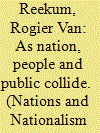

|
|
|
|
|
| Publication |
2012.
|
| Summary/Abstract |
In recent decades, Dutchness has become an intensely debated issue in Dutch public sphere. The article problematises the labelling of nations and nationalisms that occurs in public and academic understandings of these developments. Craig Calhoun's concept of discursive formation is argued to be more fruitful for understanding the recent contestations over Dutchness. Yet Calhoun's theory is itself in need of elaboration. Whereas Calhoun proposes to focus on the extent to which nations are constructed as publics of highly differentiated members, it is precisely this image that is central to an exclusionary discourse of Dutchness and enables the exclusion of cultural others from the Dutch imaginary. By analysing the enactment of Dutchness through discourses on citizenship, the surprising congruence of pluralism and exclusion in the Dutch context is explored.
|
|
|
|
|
|
|
|
|
|
|
|
|
|
|
|
| 2 |
ID:
141111
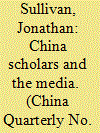

|
|
|
|
|
| Summary/Abstract |
Public interest in China, as reflected in the level of media attention, is burgeoning in the West and elsewhere in the world. This interest is driven by China's increasing presence and importance in the lives of people around the world; and for the same reason is likely to continue growing. Since media discourses are the main way in which Western publics receive information about China, contributing to media reports and helping journalists reach deeper understandings is an important task and opportunity for academics whose specialist knowledge of China is often more nuanced than that of generalist China correspondents. Although developments in the two professions are demanding closer and more frequent interactions, many scholars are reluctant to engage. This is partly due to structural disincentives within the academy, and partly due to obstacles in the scholar–media relationship. Focusing on the latter, the objective of this article is to illuminate how China scholars and journalists currently interact, and to identify means to increasing their efficiency and sustainability.
|
|
|
|
|
|
|
|
|
|
|
|
|
|
|
|
| 3 |
ID:
193261
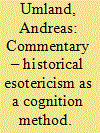

|
|
|
|
|
| Summary/Abstract |
A number of para-academic tendencies in Russian social science helped prepare the Ukraine war. In addition to propaganda and disinformation campaigns by the Kremlin, an intellectual deformation of the Russian elite by the Manichean ideas of such theorists as Lev Gumilyov and Aleksandr Dugin is partly responsible for Russia's increasing secession from Europe. Post-Soviet public discourse has become infected with an array of speculative, often conspiratorial, and sometimes occultist or racist theories. Their proponents have crowded out acknowledged social scientists and historians from intellectual and media debates. This parallel public discourse has been developing since the beginning of glasnost, 35 years ago, and became one of the determinants of Russia's attack on Ukraine in 2014.
|
|
|
|
|
|
|
|
|
|
|
|
|
|
|
|
| 4 |
ID:
190980
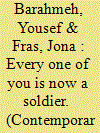

|
|
|
|
|
| Summary/Abstract |
In this article, we examine the use of war metaphors in Jordanian official discourse on the Covid-19 pandemic in 2020-21, through an analysis of videos of public statements and media releases made by Jordanian government officials at press conferences and interviews with local media outlets which were disseminated through social media. Against both the linguistic essentialism and the Western-centrism of conventional analyses of (war) metaphors, we demonstrate that Jordanian officials’ framing of Covid-19 as a security threat is not just a function of the rhetorical appeal of militarised discursive responses to the pandemic, but also aligns closely with existing ideologies of the militarisation and securitisation of public life. The mobilisation of metaphor in the context of the Covid-19 pandemic should thus be understood in relation to the specific discourses that pervade the communicative channels through which it is distributed.
|
|
|
|
|
|
|
|
|
|
|
|
|
|
|
|
| 5 |
ID:
131854
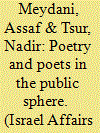

|
|
|
|
|
| Publication |
2014.
|
| Summary/Abstract |
Political poetry is not tested by its impact and the number of its readers but in its very participation in the public discourse on the issues of the day. Poetry moves between forces that focus the attention of its audience inwards, to the lyrics of the poems, and the forces that connect to the social, cultural, and political climate in which the poems are published. These movements reflect the power of poetry, which, using language, breaks the barriers that exist between people - individuals or groups, as well as between these individuals or groups and reality. This way, the poet serves as the element that formulates the informal cultural feelings in society and offers an interpretive package of the existing reality, as well as the alternative reality. Poets place their 'truth' within the perception of reality, and this truth can compete in the public arena with the 'truth' that is portrayed by politicians.
|
|
|
|
|
|
|
|
|
|
|
|
|
|
|
|
| 6 |
ID:
190966
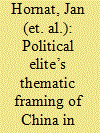

|
|
|
|
|
| Summary/Abstract |
China is geographically distant from Central European states, but cultural, economic and political exchanges between the regions are increasing. As such, the perception of China in these societies is susceptible to frames and narratives that are either instrumentally or organically created by local political elites. This paper aims to scrutinize the narratives and frames employed in the Czech Republic, Hungary and Poland during their most recent election cycles. It identifies five basic types of frames employed in the selected countries: sovereignty, opportunity, the balance of trade, debt-traps and human rights. This paper then concludes by evaluating these thematic frames and summarizes the key similarities in public discourses concerning relations with China.
|
|
|
|
|
|
|
|
|
|
|
|
|
|
|
|
| 7 |
ID:
142291
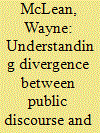

|
|
|
|
|
| Summary/Abstract |
This article explores the divergence between public discourse and Turkish foreign policy practice in the context of Turkey's regional pressures. It argues that divergence occurs because elites rearrange the hierarchy of domestic ideas that connect with foreign policy. This allows them to respond to regional threats appropriately, without undue interference from domestic political forces. Thus, to achieve optimal strategic outcomes, Turkish elites use emotive language around topics less likely to impact the immediate security, such as the USA and Israel, while deemphasizing higher order issues, such as Syria and Iran, which do have considerable security implications.
|
|
|
|
|
|
|
|
|
|
|
|
|
|
|
|
| 8 |
ID:
153637
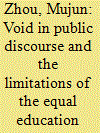

|
|
|
|
|
| Summary/Abstract |
Because of the huge impact of the hukou system (户口制度) on the allocation of educational resources in China, migrant children’s access to schools has long been circumscribed. Since 2009, a group of migrant parents in Beijing has been involved in a movement demanding their children’s right to sit for the college entrance exam in the city. Using ethnographic methods, this article reviews how the idea of equal education was contested among four groups: (1) liberal intellectuals as the leaders of the movement; (2) middle-class migrant parents as the major activists; (3) working-class migrant parents as the subjects for mobilization; and (4) participants in counter-movements. Despite the involvement of liberal intellectuals that has helped the movement make an inclusive claim, the movement has largely remained parochial, and to some extent it even served to reinforce inequality in China’s education system. I use the equal education movement as a case to reflect upon the ‘boundary pushing’ approach in studies on China’s public sphere, and contend that researchers should pay more attention to the internal power dynamics of social movement.
|
|
|
|
|
|
|
|
|
|
|
|
|
|
|
|
|
|
|
|
|